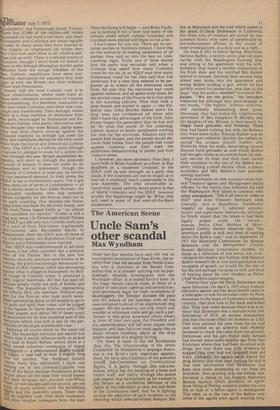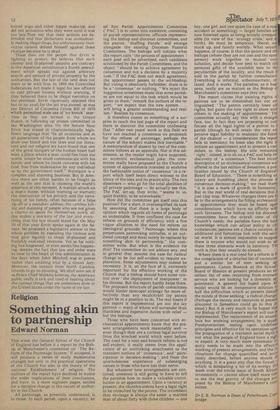Uncle Sam's other scandal
Max Wyndham
friese last few months have seep the rise to
internationl prominence of Sam Ervin, the seventy-four year old senator from North Caro
lina who is chairman of the Senate Com mittee that is at present carrying out its panstakingly detailed investigation into the Watergate affair, It is indeed Ervin's hour. In the huge Senate caucus room, in front of a cluster of television cameras and several hundred spectators eager for fresh revelations of' skulduggery, the Senator dictates the pace and the nature of the hearings with all the
ease and good humour of an experienced ring master. We the audience, can only watch and wonder as witnesses come and go, each a performer in this great American circus where. 'in front of your very eyes, the President and: his administration will fall over, regain their balance, and then fall over once again like so .many clowns tumbling about in the dirty brown sawdust of a brightly lit ring.
Yet there is more to the old Southerner than this. The Chairmanship of the Select Committee on Presidential Campaign Activi
ties is not Ervin's only important appointment, for he is also Chairman of the powerful Senaa Sub-Committee on Constitutional
Rights. It is partly through this sub-committee, which has the backing of a keen and expert staff, and partly through the power and respect that he has built up for himself in
the Senate as a vociferous defender of the rights of the individual as they are laid down in the onstitution itself, that he is fighting to stop the repetition of such incidents as the shooting which semi-paralysed Kenyon Bal
I I lew in Maryland and the raid which ended in the death of Dirck Dickenson in California. For these acts of violence are united by one common factor; they were all perpetrated by law-enforcement officers in the course of their investigations, as a duty and as a right.
On June 8 1971 in Silver Spring, Maryland, Kenyon Ballew, a twenty-seven year old plate carrier with the Washington Evening Star was sitting in his apartment with his wife. Suddenly they heard a terrible commotion at the front door and the terrified Mrs Ballew started to scream. Seconds later several large armed men broke into the apartment and seeing Ballew holding a gun, which he had quickly seized for protection, shot him in the head. "Get the police—murderrscreamed Mrs Ballew. "We are the police," the intruders reassured her although they were dressed, in her words, "like hippies," without uniforms and carelessly brandishing their guns. Previously they had raided, the neighbouring apartment of Mrs Josephine R. Murphy and her daugher of ten, Miriam, in their search for illegal hand grenades and firearms. There they had found nothing, but with the Ballews they were more lucky. Kenyon Ballew was an amateur gun collector. Quickly the raiders removed--the . antique muzzle loaders and flintlocks from his walls, discovering several disused hand grenades as well which Ballew had brought home as souvenirs from his military service. In their zeal they then turned their attention to the rest of the Ballew property, seizing a small electric clock, a pianoaccordion and Mrs Ballew's new portable sewing machine.
The interlopers on this occasion Were Federal Treasury agents and Montgomery police officers. In the outcry that followed the raid the Washington Post asked in common with other newspapers, "Did it all have to come to this?" and even Treasury Secretary John Connally, now a Republican Presidential hopeful on August 3, admitted administrative and supervisory deficiencies although he finally stated that the break-in had been
legally proper under the eircum stances. Police Chief Watkins of Montgomery County merely observed that "the American. public is sick and tired of reading about the Ballew case," and on September 15 1971 the Maryland Commission for Human Relations and the Montgomery County Human Relations Commission decided, no doubt as a reflection of this ennui, not to investigate the matter any further. And Kenyon Ballew himself? He is now semi-paralysed and incapable of speech, an invalid for the rest of his life and perhaps not quite so sick and tired of hearing about his own troubles as Police Chief Watkins might imagine.
Twenty-four year old Dirck Dickenson was more fortunate. On April 4, 1972 when Federal narcotics agents and:the local sheriff came in a helicopter to raid his secluded cabin on Pratt
mountain in the heart of California's redwood• country, they shot him in the back and killed
him. They had come because there was a ru mour that Dickenson was a manufacturer and distributor of PCP, an animal tranquiliser that has the same effect on humans as LSD.
First they scouted the area from the air and then decided on an airborne raid. Nobody bothered to check the cabin from the ground.
Dickenson and his girl friend Judy Arnold had moved there some months ago from San Francisco where they had been involved with drugs, but now there was little evidence to suggest that they had not dropped their old ways. Certainly the agents never found the drug factory that they were looking for and it Was later ascertained that Dickenson had been shot while attempting to run from his attackers, thus proving that the killing con
travened a clause in the Federal Narcotics Bureau manual w-hich prohibits an a.gent
from firing at fleeing suspects unless his own life or that of a fellow-agent is endangered. This time, as in the case of the Ballew raid, some of the agents were again wearing long haired wigs and other hippie make-up, and did not announce who they were until it was too late.They say that their actions are defensible and that Dickenson was undoubtedly making illegal drugs, but unfortunately their victim cannot defend himself against these charges because he is dead.
These then are the people that Ervin is fighting to protect. He believes that such clumsy and ill-planned assaults are contrary to the American constitution's fourth amendment which speaks out against arbitrary search and seizure of private property by the authorities. But the law of the land does not seem to be with him. In 1969 the Controlled Substances Act made it legal for law officers' to raid private houses without warning, if they believed there to be illegal narcotics on the premises. Ervin vigorously opposed this but to no avail for the act was passed, as was the District of Columbia Crime Bill of 1970 which permitted wide use of 'no knock searches as they are termed in the United States, in following up crimes committed in the Washington area. On the Senate floor Ervin has stated in characteristically highflown language that "In all countries and in all generations of the people from whom we draw our blood and our laws and our literature and our religion we have found that one of the great hungers of the human heart had been a place where a man could flee from the world, where he could communicate with his family and where he could converse with his God, free from molestation by any individual or by the government itself.Watergate is a complex and alarming business. But in America there are other battles to be fought as well as the one that is claiming the world's attention at this moment. A wanton attack on a man's home, without warning or warrant; the destruction of his privacy and the terrorising of his family, often because of a false tip-off or a mistaken address; the careless killing and maiming of people who are not given a chance to speak for themselves; surely all this makes a mockery of the law and everything that the law should stand for. On May 10 of this year Ervin spoke again in the Senate. He proposed a legislative answer to the whole problem by repealing the various acts that give legality to these ill-planned and foolishly executed ventures. Yet so far nothing has happened, or even seems like happening, despite the fact that law and order were so near to the heart of this administration in the days when John Mitchell was in power rather than awaiting 'trial by a Grand Jury. However, the senator from North Carolina intends to go on shouting. We shall soon see if as Police Chief Watkins believes, the American public really is sick and tired of hearing about the curious things that are sometimes done in the United States under the name of the law.













































 Previous page
Previous page